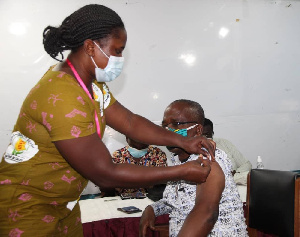 Ghana was the first country in the world to receive vaccines through COVAX
Ghana was the first country in the world to receive vaccines through COVAX
Ghana’s coronavirus vaccine rollout has been hailed as exemplary for its planning, speed and high-level leadership, but dig a little deeper and there are yet more crucial lessons in working with far-flung communities and building up trust in the vaccines.
“We have a migratory population that travels routinely from north to south across the country so their animals can graze,” says Dr Francis Kasolo, the World Health Organization (WHO) Representative in Ghana.
“Just as we have done with routine immunization, vaccination stations along their travel routes have been set up so that these populations can also access COVID-19 vaccines,” he added.
Many best practices from decades of delivering immunization campaigns, particularly for measles, were worked into Ghana’s comprehensive plans for mass COVID-19 vaccinations.
“Measles was a particularly devastating disease here, and citizens understand how measles vaccines reduced mortality. So we used this as a base for our advocacy efforts with the public to build confidence and drive uptake,” says Dr. Kasolo.
Ghana also used drones to deliver vaccines to areas without roads and sent vaccinators out into communities to stay with them for periods of time while administering the vaccines.
“Rather than wait for citizens to come to us, we made the effort and went out to them,” explains Fred Osei Sarpong, WHO Immunization Officer in Ghana.
“Information on vaccination points was shared on every channel, including national television, radio, social media and chat apps like WhatsApp, as well as through networks of district and community leaders and organizations.”
The creation of a real-time, online data management system with key information on inoculation rates and the availability of vaccines has also helped build up confidence.
Ghana was the first country in the world to receive vaccines through COVAX in late February, and just 20 days later, the country had reached over 470 000 people in areas with the highest number of COVID-19 cases, including around 90% of all health workers.
“We identified 43 areas where high transmission of the virus was evident, and started with those districts, sending out mobile teams to administer vaccines,” notes Osei-Sarpong.
On 7 May, the country benefited from a further 350 000 doses redirected from the Democratic Republic of the Congo, which is a testament to Ghana’s rapid, efficient and coordinated response to the public health crisis and ability to swiftly roll out vaccines.
To date, Ghana has fully vaccinated around 2.7% of its population. Vaccination rates across Africa remain low due to supply constraints: just 1.6% of the continent’s population has been fully vaccinated so far.
The strong and visible commitment to getting vaccinated from Ghana’s leaders, with the President, First Lady and Vice President and Second Lady all vaccinated live on national television at the outset of the campaign, all helped drive up demand.
Yet according to WHO Representative in Ghana Dr Kasolo, as a devastating follow-on wave of new cases hit the country in recent months, death rates have also played a big role.
“About four weeks ago I visited Kumasi [the capital city of the Ashanti Region, in southern Ghana], which has had the highest COVID-19 related mortality rates. There were huge queues of people waiting to be vaccinated there. When I talked to them, I realized that some had lost relatives to the virus and suddenly it had all become very real for them.”
“This was definitely driving up the appetite for vaccination. They were no longer being told about the devastating effects of COVID-19, they were living through them.”
Ghana continues to battle misinformation, which remains a constant challenge in ensuring public trust in the vaccines.
“COVID-19 information overload and fatigue, the novel nature of the virus itself and the trickling in of videos from the West showing coronavirus sceptics, to mention just a few challenges, are hampering the efforts to fight the virus,” says Rabiu Al-Hassan, Managing Editor of the Accra-based fact-checking organization Ghana Fact.
“Other factors are rooted in religious beliefs, while a false sense of security seems to be growing after watching European football games with cheering fans in attendance, while many European countries have vaccinated most of their adult populations.
Ghana expects many more doses to arrive in the coming months and is building up its ultra-cold chain capacity to handle a range of vaccines. It is also looking at how to move these facilities closer to remote communities.
Reflecting on the success of the rollout to date, WHO’s Dr Kasolo attributes the high absorption capacity to efficient planning, driven by a strong national coordination mechanism.
“Chaired by the President, the inter-ministerial task force included both government and independent players. While our regulatory authorities imparted critical advice about the safety and efficacy of vaccines, the inclusion of independent partners helped boost confidence among the population, so reduced vaccine hesitancy,” he explains.
“Vaccine availability is now a real challenge for Ghana, but we have been given assurances that hundreds of thousands of doses are likely to reach us by about August,” he says.
Offering his best advice to neighbouring African countries, Dr. Kasolo explains that one of the most important lessons Ghana learned early on was to involve everyone, from the President and the government right down to communities.